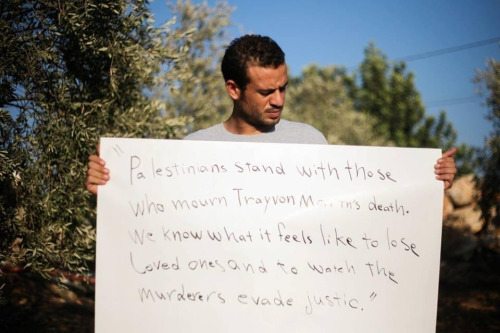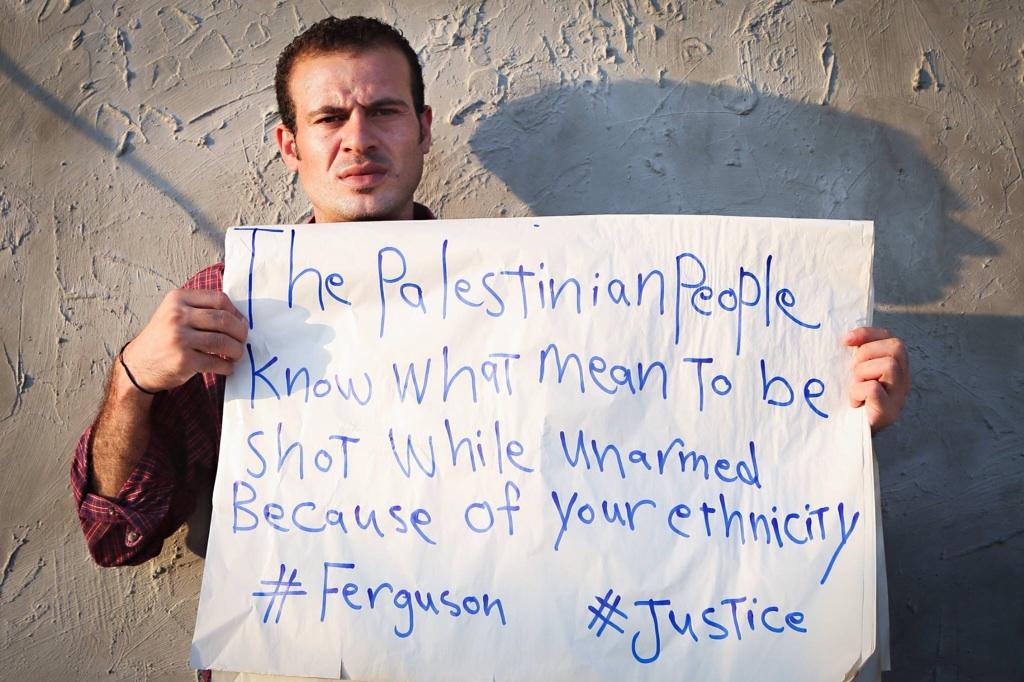White supremacy in the United States closely resembles the occupation of Palestine.
White supremacy in the United States closely resembles the occupation of Palestine.
The acquittal of racist murderer George Zimmerman sparked outrage and demonstrations not only in the United States, but all around the world—including in Palestine. Many Palestinians circulated pictures of themselves holding signs that read: “Palestinians stand with those who mourn Trayvon Martin’s death. We know what it feels like to lose loved ones and to watch the murderers evade justice.”
Here in the United States, Students for Justice in Palestine and Students United for Palestinian Equal Rights released a statement saying:
“As people who are fighting for justice in Palestine, we understand how racism is used to justify and perpetuate an unjust system that oppresses whole populations. Our government tries to divide us by telling us that Black is synonymous with ‘criminal’ in the same way that it tries to tell us that Arab and Muslim is synonymous with ‘terrorist.’”
This was just one episode in a longer history of solidarity between the Black and Palestinian struggles.
Historically and presently, there are clear parallels between the oppression suffered by the Black and Palestinian nations. From racial profiling, to the incarceration of youth to whites-only roads, neighborhoods, buses, housing and schools; white supremacy in the United States closely resembles the occupation of Palestine. Companies like G4S profit off of the racist mass incarceration of both African Americans in the United States and Palestinians in Palestine.
There is likewise a long history of the Black freedom movement standing with the cause of Palestinian liberation, drawing the connection between their shared experience of national oppression and resistance against European colonialism. In fact, just as the struggle over Palestine became a decisive issue in the movement against the Iraq war, defining one’s attitude towards imperialism in general, the “Palestine question” has at various times been a dividing line in the Black freedom struggle.
Solidarity grows at the height of the struggle
Some of the strongest support for the Palestinian liberation movement from Black leaders and organizations came during the radical upsurge of the 1960s and 70s.
Malcolm X was a staunch opponent of Zionism. He famously polemicized against it in “Zionist Logic,” an article published in The Egyptian Gazette in 1964. In the document, Malcolm X notes the parallels between the subjugation of Palestinians and Africans. He pointed out the strategic value of Israel to world imperialism,
“The ever-scheming European imperialists wisely placed Israel where she could geographically divide the Arab world, infiltrate and sow the seed of dissension among African leaders and also divide the Africans against the Asians.”
In 1964, Malcolm X was one of the first African American leaders to meet with the newly formed Palestine Liberation Organization.
One of the first workers’ organizations to take up the cause of Palestinian liberation was the League of Revolutionary Black Workers, based in Detroit. Black and Arab autoworkers there jointly participated in LRBW-led wildcat strikes, and the group’s solidarity with Palestine became a point of struggle with the city’s ruling class. The LRBW had transformed Wayne State University’s student newspaper into a radical citywide paper, but after publishing pro-Palestine articles the administration used the false charge of anti-Semitism to launch an all-out attack on the LRBW on campus.
Likewise, as the Black freedom movement entered a new stage in the mid-1960s, from civil rights and legal equality to national liberation, Palestine became a symbol of the shift. The Student Non-Violent Coordinating Committee, undergoing its own radical transformation, broke sharply from official liberalism when it declared its solidarity with Palestine in the Arab-Israeli War of 1967.
The Black Panther Party was also a supporter of the Palestinian struggle. In his article, “On the Middle East,” BPP leader Huey Newton states:
“We support the Palestinians’ just struggle for liberation one hundred percent. We will go on doing this, and we would like for all of the progressive people of the world to join our ranks in order to make a world in which all people can live.”
As it evolved into an internationalist organization, the Black Panther Party recognized that in order to end the oppression of the people in the United States, they had to work for the end of imperialism all over the world. Palestine was at the forefront of that worldwide confrontation.
In 1970, an appeal was published in the New York Times titled “An appeal by Black Americans against United States support of the Zionist government of Israel.” This statement was issued by the Committee of Black Americans for Truth in the Middle East and signed by prominent Black revolutionary leaders including James Boggs and Robert F. Williams.
The appeal explains the committee and their supporters’ unwavering solidarity with their Palestinian sisters and brothers who are struggling every day to end the occupation of their country. It ends by demanding, “[T]hat all military aid or assistance of any kind to Israel must stop. Imperialism and Zionism must and will get out of the Middle East. We call for Afro-American solidarity with the Palestinian people’s struggle for national liberation and to regain all of their stolen land.”
Black solidarity with Palestine today
This solidarity continues today on many fronts, including support for the international Boycott, Divestment and Sanctions movement. Prominent Black intellectuals, including Angela Davis, Cornell West and Alice Walker, have endorsed the call for BDS.
As Israel unleashed war on Lebanon in 2006, world-famous Black writer Toni Morrison, along with 17 other prominent intellectuals, issued a principled statement condemning Israeli aggression and refusing to equivocate in the face of the demonization of Palestinian national liberation forces. It stated,
“[T]he subsequent arguments, accusations and vows, all serve as a distraction in order to divert world attention from a long-term military, economic and geographic practice whose political aim is nothing less than the liquidation of the Palestinian nation.”
While former Congresswoman Cynthia McKinney and former NYC Councilman Charles Barron have both stood up for Palestine, there are few Black elected officials who have followed suit. This is because maintaining Israel as a vital extension of U.S. power in the Middle East remains a strategic point of U.S. ruling class unity. For any member of Congress to remain “in the mainstream,” they cannot cross this red line.
As the viciousness of the racist U.S. and Israeli ruling classes escalate, the tradition and ongoing practice of Black-Palestinian solidarity is just as important as ever. As well as its strategic importance, the unity of African American and Palestinian freedom fighters illustrates a key theme in Black history—the Black struggle has always thrived on internationalism, and cannot be separated from the struggle of all peoples around the world fighting for liberation.
This article was originally published here.







